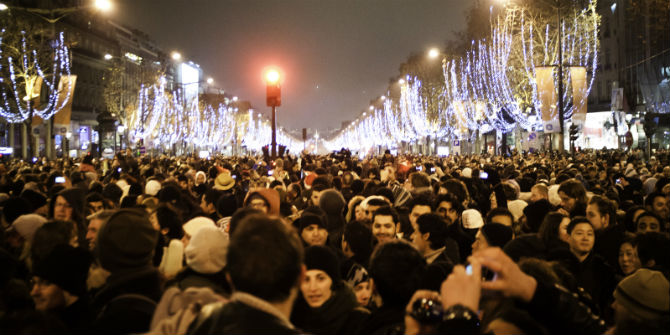 Although the anti-immigration feeling expressed by the Leave vote was ostensibly directed at other Europeans, racist hate crime also surged immediately after the EU referendum. Brendan McGeever (Birkbeck, University of London) (left) and Satnam Virdee (University of Glasgow) locate the causes of Brexit in neoliberalism, the decline of working-class solidarity, and the emergence of a new politics of racist resentment.
Although the anti-immigration feeling expressed by the Leave vote was ostensibly directed at other Europeans, racist hate crime also surged immediately after the EU referendum. Brendan McGeever (Birkbeck, University of London) (left) and Satnam Virdee (University of Glasgow) locate the causes of Brexit in neoliberalism, the decline of working-class solidarity, and the emergence of a new politics of racist resentment.
The neoliberal settlement in Europe, crafted over three decades by conservative and social democratic parties alike, has been dramatically unsettled by the most sustained economic depression since the 1930s. It is the hard right, first and foremost, that has capitalised on these historic developments. From Sweden to Switzerland, from Belgium to Bulgaria, a tide of reactionary populism has been sweeping the European mainland which demands nothing less than a restoration of a mythical golden age of sovereign nation-states defined by cultural and racial homogeneity. Britain has not been inoculated from the turbulence created by this decade-long and still unfinished crisis of late capitalism. The most striking manifestation of that crisis is Brexit.

If confirmation were needed that the Brexit vote was intimately bound up with questions of race, we need only recall the wave of racist hate unleashed against migrants as well as the long-established black and brown British in June 2016. How could it come to pass that the first formal break from the 30-year neoliberal consensus in Britain was marbled through with such racism and violence?
Englishness: empire, decline and class decomposition
We suggest the relationship between race and Brexit cannot be understood without accounting for the invisible driver of Englishness. There is a compelling case to centre the English story in Brexit: 87 per cent of Leave votes were cast in England. Further, 79 per cent of those who identify as “English not British” voted Leave, as did 66 per cent of those who identified as “more English than British”. This particular vision of Englishness, we suggest, is characterized by a new politics of resentment underscored by structural decline and class decomposition.
Many have suggested that the Brexit visions conjured up by the official Leave campaign in 2016 were stained through with imperial nostalgia. We agree. However, the racism that animated the Brexit voting public in 2016 has its moorings not just in the aching loss of Empire, but also the structural decline that Britain has undergone since the late 1970s and the onset of neoliberalism. The politics of Englishness today asserts itself against a backdrop of Britain’s comparatively marginal position in the world economy. Alongside this are the defeats endured by the social movements of the 1980s and the accompanying delegitimising of socialist politics, which has left a working class profoundly disaggregated by region, nation and ethnicity. In this sense, it is the transformations of the 1980s, rather than the austerity programmes since 2008, that bear heaviest on our present moment.
Significantly, the period of working class defeat under the Conservatives led by Thatcher was accompanied by the loss of alternative class frames of resistance, including those that re-imagined the working class as multi-ethnic. Although the organisations of the working class and the left more generally have a long history of imbrication in the politics of racism in England, these organisations have, at the same time, provided limited but nevertheless important cultures of solidarity that have in turn played a key role in re-imagining black and brown migrants (and their British-born descendants) as part of the working class. Under Conservative rule, the politics of class and the language of solidarity that had underpinned working class politics were significantly weakened. The historic settlement of post-1945 Britain that labour, to a limited degree, was to be protected from capital was reversed. These defeats in turn profoundly diminished those counter-currents of anti-racist class politics, including those aligned to the politics of blackness.
In recent years, the prospect (and reality) of downward mobility has produced class injuries and collective experiences that have been recast through the politics of ressentiment. Whereas thirty-five years ago labour and anti-racist movements could meaningfully intervene, today the realignment of British politics has (in England, at least) left the terrain wide-open to the right, from the neoliberal mainstream to its far-right outriders. In this context, decline, though necessarily a multi-ethnic process, is experienced in a racialised frame and is increasingly responded to by some sections of the working class through the politics of resentful English nationalism. The realignment of politics to the right has therefore created an environment in which racism can be more readily articulated since it resonates with the cultural and political logic of our time.
This racialising nationalism has borne a particularly defensive character since the 2008 crisis.
It is defined not by imperial prowess or superiority, but by a deep sense of loss of prestige; a retreat from the damaging impact of a globalised world that is no longer recognisable, no longer “British”. The decline of empire, then, has not led to the overcoming of the English imperial complex, but its retraction into a defensive exclusionary imaginary: we are under siege, it is time to pull up the drawbridge. This was one of the defining features in the discursive architecture of the Leave campaign. As Stuart Hall once put it, “Englishness has always carried a racial signature”. We are hearing its familiar refrains in these crisis-ridden post-Brexit times.
As large-scale survey data shows, the main drivers of political Englishness are Euroscepticism and concern about “immigration”. Indeed, it is the racialised question of “immigration” that is arguably now defining the conversation around Englishness. In the 1980s and 1990s, public concern about “immigration” remained relatively low, with no more than 10 per cent of the population seeing it as a key issue during this period. Since 2000, however, the hardening of attitudes has seen that figure rise dramatically to 30–40 per cent, such that by 2006 “race and immigration” were recorded as the most important issues facing the country. The toxicity of the 2016 EU referendum has deepened these trends, and brought us to what we would now define as a state of emergency. The interlocking features of racialised nationalism, anti-immigrant sentiment and Euroscepticism – identifiable across the whole of Europe – have come into full view in Brexit Britain, particularly in England. Racism has become normalised in both elite political discourse and practice and everyday life, dramatically diminishing the spaces for Britain’s racialised minorities to breathe and live life free from hate.
The emergence of the ‘white working class’
Yet while Brexit added an accelerant on those conditions and allowed racism to flourish, it did not create them. Across the political spectrum, from New Labour to Conservative, a powerful narrative has become dominant over the last decade in which the principal losers of globalisation are referred to as the “white working class”. And this message has been amplified over and over again by the right-wing press who deploy this category for their own instrumental ends, particularly for eroding support for multiculturalism. As a result, the white working class – a descriptive and analytic category whose origins lay in social science research – has over the course of this decade-long crisis been brought to life ass a collective social force, such that some working class men and women now understand and make sense of the real economic pain they suffer through such a racialised frame of white working class victimhood.
This construction of the white working class has led to a number of deleterious developments in the field of politics. First, it has helped cohere and then shift those parts of the working class most enamoured of such an identification into the camp of the anti-immigrant right: that is, they have come to invest politically in understanding themselves (i.e. the white working class) as the main victims of globalisation. Second, by juxtaposing the category white working class to immigrant, such a narrative not only privileged one stratum of Britain’s working class over the other on the grounds of citizenship, it also erased those parts of the working class who were black and brown Britons. And through this sleight of hand, the lived experiences of those whose economic austerity was overlain by race and gender discrimination were simply elided and closed off from public scrutiny and debate. Third, and related, this had the effect of further dividing the multi-ethnic working class on racial lines, and in doing so submerged those other explanations for working class pain – the austerity imposed by Labour and Conservative elites alike. This has damaged (but not ruled out) the possibility of a united working class challenge to neoliberal rule.
An urgent question is therefore before us: can a multi-ethnic class politics re-emerge in a juncture where the racist right are in the ascendency and the infrastructure of anti-racist resistance appears hollowed out and in long-term retreat?
This post represents the views of the authors and not those of the Brexit blog, nor the LSE.
Brendan McGeever is Lecturer in the Sociology of Racialisation and Antisemitism at Birkbeck, University of London.
Satnam Virdee is Professor of Sociology at the University of Glasgow.







It really is sad that the LSE allows 3rd-rate Ology ‘academics’ to publish their anti-white drivel on here. The alleged rise in hate crimes following the Leave vote has been comprehensively debunked numerous times (it’s telling that the authors’ assertions have zero supporting evidence included) so this article offers absolutely nothing of value.
Twaddle.
I just don’t see it!
How can a two choice question in the referendum result in racism accusations?
neoliberal Europe is simply a victim of its open doors policy.
Technology plays a very important part in the change.
In third world countries the smart phone is prioritiesed over a roof on the house.
The population can now see how rich Europe is first hand. Who can blame them from wanting that as well?
It’s a coincidence that technology and neoliberalisation happen at the same time.
The rapid influx of third world immigrants is unsettling to the indigenous when integration is inevitably slow.
Cultures play a big part in values of society and have been earned, those values are precious.
How one can call that racism is quite simply baffling!!
The answer in my view is to put the fire out!
Instead of the rich Europe opening its doors, intervention in a positive mode is likely to bring fruits.
invest in helping these countries to have what we have.
To turn this article on its head.
It does third world countries no good to say you cannot deal with our club unless you pay us a bribe with import duties.
The monies developed by these bribes does not benefit the ordinary citizens of Europe, but feed to greed culture of Brussels.
Europe is the richest and nearest market for much of the third world, but the Eu club closes doors to them.
That cannot be right
But outside of Europe the U.K. can right these wrongs.
EU keeps the doors closed to the third word???
‘The EU signed an Economic Partnership Agreement (EPA) on 10 June 2016 with the SADC EPA Group comprising Botswana, Lesotho, Mozambique, Namibia, South Africa and Swaziland. Angola has an option to join the agreement in future.’
That’s just part of the trade agreements they have with third… (Developing) world.
Its understandable though, you haven’t been told of the countries Europe has agreements with hence you point above. Maybe a little more research, rather than believing the BS that flows from Liam Fox, Boris Johnson and Jacob Rees Mogg. But then you were probably swayed by the Turkish argument put forward by Boris Johnson….. even though he now denies it. Or the 350 Million a week for NHS, which has also been proven to be a lie.
The article focuses on the so called “racist right.”
When I look for racism in a mass political movement, I see the racist left on display day after day after day.
It’s all in your head. For heaven’s sake get out and look at the real world, not one viewed through a thick fog of make-believe and denial.
Superb analysis, thanks for some excellent insights.
Would this max be the Max Schulze academic from LSE?
Farcical!
I’ve tried to post this before but it didn’t appear
Suspect Lse tookit down
Nope just a Max who appreciates a really good analysis when he reads it.
>>There is a compelling case to centre the English story in Brexit: 87 per cent of Leave votes were cast in England.
I’m sorry but that is just shockingly innumerate. You do understand England is a lot bigger than the other countries? And that by the same token, 82 per cent of Remain votes were cast in England?
A thoughtful and thought-provoking article on a crucially important topic. It’s understanding of the fragmentation of working-class solidarity is brilliant, and worthy of one of George Bernard Shaw’s Fabian essays. The essay’s insights are offered in that old Shavian-LSE tradition, methinks. But what astonished me about the entire Brexit campaign (I mean looking at it as a citizen of the small Republic of Ireland) was how the most influential Brexiteers completely underestimated the great power of the United Kingdom within the European Union. British people constantly underestimate the power of the UK; this is one of the absolute constants I have observed in forty years of observing British people. It is a lazy trope to harp on about ‘loss of Empire’ and all that. Few British people I’ve ever met ‘lament’ the loss of Empire. But they do underestimate how important Britain is in the European scheme of things. The prestige of the UK will suffer a temporary hit as a result of Brexit, but Britain’s size and its cultural centre-of-gravity will ensure its long-term prosperity. The UK is still a world leader in technology, in literary culture, in high value manufacturing and software, in communication and creative industries, in trade and finance. None of these things will change. Take it from me, an Irishman who loves being an EU passport-holder, the UK will do just fine inside or outside the EU. Ireland, being small country, doesn’t have the kind of options open to the UK, hence we must stay inside this EU tent. I am just back from America — have you any idea, ANY IDEA, of the prestige and standing Britain enjoys among Americans, even among Irish-Americans? You would be embarrassed to discover how must Britain is loved and admired from coast to coast across the US. The respect for British people, for British history, culture, humour, fortitude, remains absolutely undiminished. I have observed it actually increasing over the last three decades. So, this was the greatest error of those who proposed Brexit to the British people — they had no real understanding of the moral and strategic power of the UK. Maybe it takes an outsider to see this. The good thing is — whether or not they understood this power, this power will endure, Brexit or no Brexit. The great burden now, for leaders of public opinion in England, is to quickly articulate a new vision of a British future. The working-class as well as the middle-class desperately need a view of the future.
“Racist hate crime also surged immediately after the EU referendum. ”
Any evidence of this? Admittedly there has been a recent increase of extreme views generally on social media but this doesn’t seem to be Brexit specific. As far as I have read for a fortnight there was a reported 50% increase in ‘hate crimes’. To put this into context it means that there was 21 days of incidences in a 14 day period. The shocking thing to me was not the 50% increase but the baseline figure itself. (Something which seems to have escaped the attention of those who were most outraged.) Even the reported increase is a bit suspect. The most widely reported incident was a brick through the window of a Polish shop. This turned out to be not a racist attack but a simple smash and grab. If long standing residents are victims of crime then recent arrivals will be also.
In the days after the referendum, there was febrile talk in the media of a racist Britain which gave the impression that it was only a matter time before we would be seeing anti-immigrant graffiti and marching on our streets, but I have never seen any and neither have you.
Racism appears to be more of a problem in other EU countries most certainly right wing political parties seem more prevalent.
Sad to see such a lack of historical awareness in social scientists. Not a shred of evidence presented that the ‘wwc’ Is a discursive construction of the intelligentsia foisted onto the (ignorant and intellectually passive) ‘wwc’ (Cf Durkheim on priests and religion as a con). Watch any footage of trade union activists in 60s and 70s – as I just did at the ICA today for three hours and all you see is wwc males…..- or think of Enoch Powell’s reception as a hero in the docks in 1968…. perhaps the LSE could donate copies of David Kynaston’s great post-war histories to this hapless pair…and spare the rest of us their posturing until they bother to get some data?
Racism is bad because it stereotypes people by the colour of their skin as in
“they have come to invest politically in understanding themselves (i.e. the white working class) as the main victims of globalisation. “
“In the 1980s and 1990s, public concern about “immigration” remained relatively low, with no more than 10 per cent of the population seeing it as a key issue during this period. Since 2000, however, the hardening of attitudes has seen that figure rise dramatically to 30–40 per cent, such that by 2006 “race and immigration” were recorded as the most important issues facing the country.”
A critical analysis of this statement must look at the scale and pace of immigration to the UK. In general, in the 1980s and 1990s, there was relatively little immigration. From the late 1990s in the time of New Labour, however, immigration accelerated wildly. It would not stretch boundaries of truth to state that the scale and pace of immigration in the past 20 years has no precedent whatsoever in British history. In this, we do know much about immigration of this period. However, the most significant question that has never been reasonably addressed is: ‘why’. Why has the establishment more broadly, and the cultural left specifically, suddenly embraced immigration with such dogmatic enthusiasm? And consequently, why has it ditched support for the indigenous (white) working class so suddenly? This is not an isolated phenomena in the UK as similar examples can be found in the United States, Canada and Germany. One may observe that a consequence of this cultural turn by the ‘virtue-signalling’ middle classes is that it has had a significant and detrimental on their domestic politics. Their enthusiasm for ‘the other’ is not shared by large sections of the traditional working class. In this regard, are Brexit, AfD and Trump the consequence of left wing cultural overstretch? There has been a significant and unsettling reaction against a political class that has developed policies that are often put beyond political debate. The contemporary left has, at best, turned a deaf ear to concerns about immigration. At worst, it has displayed self-righteous indignation to demonize the non-cosmopolitan, un-globalised working classes as ‘racist’.
If indeed the West is seeing the ‘rise of the right’ it may be, whisper it, that this is a political and cultural Frankenstein created by the left itself.